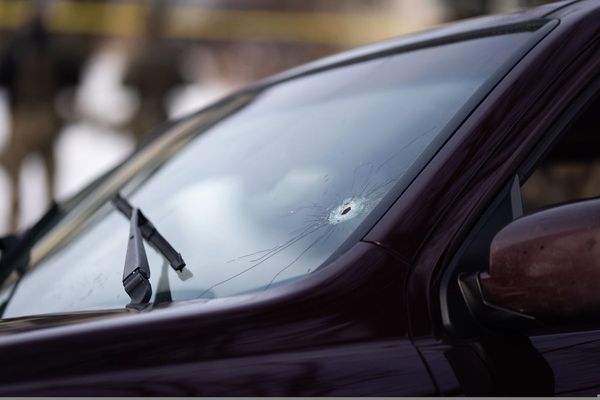
From the gleaming tailfins of 50s rock’n’roll through Bruce Springsteen and beyond, cars are one of the most well-travelled tropes in rock. Mostly, they equate with the freedom of the open road, with status and flash, with outrunning the law. Or they provide a place to have it off.
Arctic Monkeys’ elegant seventh album, The Car, deals in none of that. From the cover art – an aerial view of a lone car in a vacant lot, shot by drummer Matt Helders – to brief mentions in frontman Alex Turner’s lyrics, this is an album about a getaway vehicle shorn of glamour. The cover photo implies surveillance, a spy theme that ties in with other mentions of covert activity on The Car – there’s someone sweeping an apartment “for bugs” in the title track (although that could just be a reference to unsanitary holiday accommodation – it’s hard to tell). Sculptures of Anything Goes reflects, among other things, on Turner’s move from Los Angeles back to the UK. “Village coffee mornings with not-long-since-retired spies /Now that’s my idea of a good time,” he winks.
Mostly, though, the cars on this album have a finality to them, taking people away. Far harder to parse than its immediate predecessor, 2018’s Tranquility Base Hotel & Casino, The Car is, nonetheless, an achingly bleak album of leave-takings; opaquely beautiful, like a classic car with tinted windows.
It’s very much a farewell to LA, where this Sheffield band have spent much of the past decade. Turner’s assiduous documenting of that town’s night-time economy peaked twice: with 2013’s brilliant AM, whose title simultaneously riffed on the band’s initials, the wee small hours and the AM radio dial, and with the equally excellent – but very different – Tranquility Base. Although set in space, Tranquility Base had “a taqueria on the roof” and very much reflected 21st-century life on the ground in California.
But Tranquility Base was, itself, a departure. After AM, one of the best and best-loved rock records of its generation, Tranquility Base found Arctic Monkeys dialling down their guitars in favour of lounge bar atmospheres. Now The Car doubles down on those non-rock stylings with string sections and Turner leaning into his inner crooner, ably summoning up Scott Walker and 80s David Bowie, retro soul and brittle funk. You might even argue Arctic Monkeys are two bands now: the riff machine that sends festival moshpits into paroxysms and highly sophisticated operators, untethered by genre.
As Turner bid LA adieu, relocating his high-life observations to the French Riviera, there are also many farewells to lovers on The Car, alongside interrogations of old ways of doing things. Peering into the windscreen, you can see a breakup album of sorts. There’d Better Be a Mirrorball finds Turner’s protagonist walking slowly to a waiting car, feeling the weight of his emotional baggage. Body Paint suggests infidelity, with an opening couplet for the ages. “For a master of deception and subterfuge/You’ve made yourself quite the bed to lie in,” Turner sneers in a delicate falsetto.
Just as often, The Car finds him dislocated (I Ain’t Quite Where I Think I Am), baffled or wistful. “When it’s over, you’re supposed to know,” he reflects on Jet Skis on the Moat, a squelchy soul cut. On Hello You, someone is “dragging out a long goodbye” to string arpeggios.
Is that Turner checking himself in the rearview mirror? Because The Car is Arctic Monkeys’ most self-reflexive album yet. Turner’s writing and the band’s arrangements have long referenced the big screen (their debut album, Whatever People Say I Am, That’s What I’m Not, lifted a line from 1960’s Saturday Night and Sunday Morning for its title) as well as film soundtracks. One major subplot on The Car is “the business they call show”, encompassing nods to film and “performing in Spanish on Italian TV”. Songs such as Mr Schwartz offer up vignettes set in the film industry, among the grips and costumiers.
But analyses of band life abound, too. Fans often think songs are about them, but it’s hard not to concur as Turner metabolises criticism of Arctic Monkeys’ last album. “Puncturing your bubble of relatability/With your horrible new sound,” oozes Turner on Sculptures of Anything Goes.
The more panicky among the fanbase could be forgiven for wondering whether Turner is ready hang up his guitar and turn his hand to screenplays. “Over and out, it’s been a thrill,” notes Big Ideas, while album closer, Perfect Sense, wonders when the song’s protagonist’s “invincible streak” will hit “the final straight”. There is one salient, nailed-on fact about this enigmatic album, however. It’s how easily its most anthemic cuts will slot into those revved-up Arctic Monkey festival set lists.







